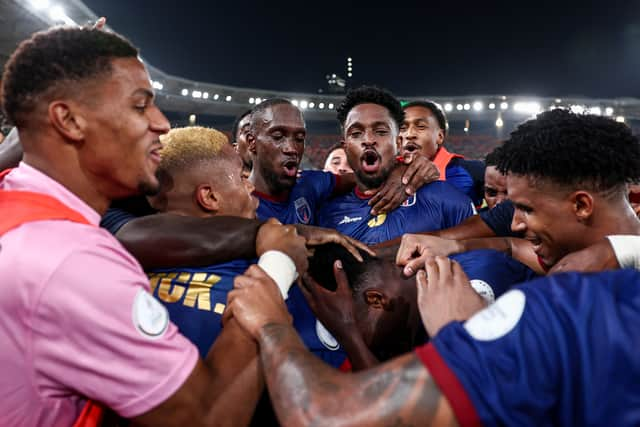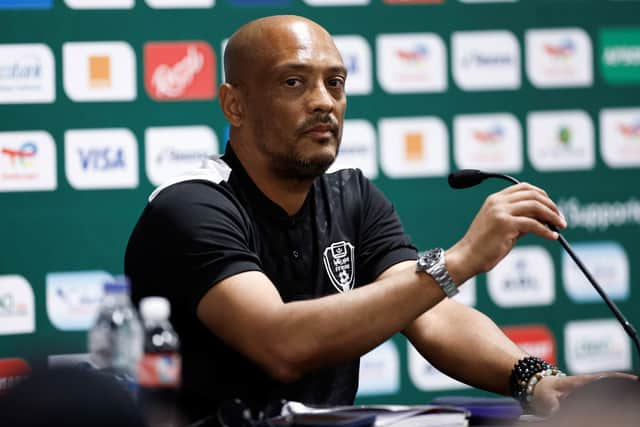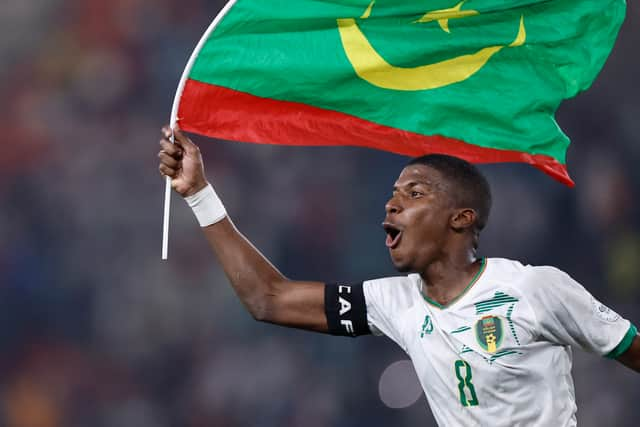Cape Verde and Mauritania's fairy-tale AFCON match - and the extraordinary stories behind it
and live on Freeview channel 276
On Monday, the Africa Cup of Nations will feature a fairy-tale match-up between two teams who have surpassed incredible odds to make the knockout stages. Both Cape Verde and Mauritania, neither of which had even qualified for AFCON before 2013, have earned their places in the round of 16 thanks to astonishing acts of giant killing, and the stories of how two nations with extremely limited footballing history have made it this far are remarkable.
Cape Verde have made the quarter-finals once before, in South Africa in 2013, their debut tournament. Following draws against the hosts and Morocco, both impressive results in their own right, they scored twice late on to beat Angola and advance from a group in which they had been expected to finish last. Ghana knocked them out at the next stage, but Cape Verde had thrown down a marker – the first sign to the world that they were African football’s coming power.
Advertisement
Hide AdAdvertisement
Hide Ad

Cape Verde itself consists of a string of ten islands in the Atlantic ocean with a population of just 562,000 – less than the city of Bristol. Their rise in the global game was astonishingly rapid – they did not even enter AFCON qualification until 1993, but once they had made their name in South Africa, their football association, the FCF, worked hard to ensure that their unexpected success became a springboard.
In 2013, 18 of the 23 members of the squad were born on the islands, but since then the FCF have reached out to Cape Verde’s substantial global diaspora to recruit players from far and wide. Only one member of this year’s squad, captain Stopira, plays his football in Cape Verde itself, and their players ply their trades across the world – two are in the MLS, others play in Azerbaijan, Moldova, Cyprus, the Netherlands, Italy, Austria and even the Republic of Ireland.
Many of those players are the descendants of emigrees from the sixties and seventies, when many Cabo Verdeans sought a better life outside of their tiny country. Most of them went to Portugal, the colonial power which controlled Cape Verde until independence in 1975, but there are communities all over Europe. Plenty of the players in the squad don’t speak Portuguese, the official national language, but they have learned to communicate using Cape Verde’s unique creole dialect. Local music is played in the dressing room, helping to bind the outside recruits to their cultural identity, newfound or otherwise. Given recent results – they made the knockout stages again at the last edition of AFCON and are joint top of their World Cup qualifying group with Cameroon - those attempts at fostering togetherness have worked wonders.
One member of the diaspora who has been recruited to the cause will be familiar to Premier League fans – Bebe, the former Manchester United forward whose progress from homelessness to the top flight made him an astonishing story, but whose struggles after his expensive signing also made him the butt of many cruel jokes. Now 33 and playing for Rayo Vallecano in La Liga, he made his debut for the Blue Sharks in 2022 and scored an incredible 40-yard free-kick during the defeat of Mozambique in the group stage, a thunderous strike which swerved and dipped savagely, wrong-footing the unfortunate goalkeeper Ernan Siluane.
Advertisement
Hide AdAdvertisement
Hide AdHe is the starriest name in the show, but it is the togetherness of the team that has shone through this year, and which has helped them to top a tough group in extraordinary fashion – an injury-time winner saw them past Chris Hughton’s Ghana before they demonstrated amazing resilience to score a 99th-minute equaliser to draw 2-2 against Egypt. Their form means they will go into the game against Mauritania as favourites.
Mauritania’s own rise has perhaps been even more meteoric. Between 1995 and 2003 they failed to win a single match and hit a world ranking of 206th – rock bottom of FIFA’s ladder. That they even reached their first AFCON back in 2019 represented an impressive turnaround, but they have now qualified for three tournaments on the bounce. In 2024, they have reached the knockout rounds for the first time, earning an astonishing win over Riyad Mahrez’s Algeria in the process.
Having been narrowly defeated by both Angola and Burkina Faso in their first two matches, defender Yali Dellahi’s first-half goal - a bouncing ball volleyed into the ground, off the inside of the post and in - was enough to knock the 2019 champions out and see Mauritania through as one of the best third-placed sides. It was their first win in the tournament, and a testament to the impressive work done by head coach Amir Abdou.
Marseille-born Abdou was the mastermind behind AFCON 2021’s most remarkable piece of giant-slaying, when he coached Comoros through to the last 16 in a fashion redolent of his work with Mauritania this time around – two narrow defeats, followed by an incredible win over Ghana to make it through the group. In making the knockouts with Comoros he has already made history, as the Pacific island nation had never even made the main draw before. In repeating the feat, he has earned a reputation as a worker of minor miracles.
Advertisement
Hide AdAdvertisement
Hide Ad

His squad is even less starry than Cape Verde’s. The only player liable to be recognised by British football fans is Aboubakar Kamara, who spent four seasons at Fulham between 2017 and 2021, a spell which was interspersed by loans away in Turkey and France. Six of the remaining squad members play in Mauritania, while the rest are scattered across Africa, Asia and Europe. There are some club names that will ring a bell with football hipsters – Guingamp, Sint-Truiden, TP Mazembe – but most play at a much lower level, with three defenders drawn from the Iraqi league, for example.
Given his limited resources, Abdou has set his side up to be tough and rigid in defence, with free-flowing football not really on the table. Against Algeria, they enjoyed just 25% of the possession, but proved impossible for one of the pre-tournament favourites to break down. They will need another rugged, organised display if they are to reach the last eight for the first time in their history.
Much of Mauritania’s extraordinary turnaround, from bottom of the pile to AFCON regulars, can be put down to the work of their football federation, the FFRIM, who used funding from FIFA programmes which reinvest World Cup profits to renovate their national stadium in the capital of Nouakchott, build a new medical centre and set up a youth academy with synthetic training pitches, a major upgrade in a Saharan country which is mostly desert. Nearly £9m has been spent, and judging by the results it has been spent very well indeed.
That work earned the approval of FIFA president Gianni Infantino, who praised the federation’s “thoughtful investments” when he visited Mauritania in 2021 while they were hosting the Under-20 AFCON. Hosting that tournament represented a substantial step forward for the country’s standing in the football world in its own right, but as is so often the case with FIFA tournaments, there are some very valid concerns over whether an international event should have been hosted there at all.
Advertisement
Hide AdAdvertisement
Hide AdMauritania is one of the few countries in the world where slavery remains institutionalised. It was notionally abolished in 1981 – which in itself made them the last country in the world to ban the practice – but no criminal laws were enacted to enforce the ban until 2007, and even now the practice remains rampant.
Mauritania’s race-based slave culture sees members of the Haratin – Black Africans who are the descendants of slaves captured in historical raids and conflicts – as a “slave caste” and many of them still live in bondage. In 2012, a CNN report estimated that 10-20% of Mauritania’s population (currently over four million) lived in slavery. A more recent report by the Australia-based Walk Free Foundation, which monitors slavery worldwide, estimated that around 136,000 people live in conditions of slavery today, more than any other nation save for Eritrea and North Korea.


The Mauritanian government’s official line is that slavery no longer exists in the country, but they spend considerably more resources on going after groups and individuals campaigning against slavery than they do on prosecuting slave owners. As of 2012, CNN reported that just one such prosecution had taken place. The government also stand accused of using torture and closed trials to persecute campaigners and political opponents.
Institutionalised racism in Mauritania has also affected football. In 2016, the government banned a Black youth football team from travelling to Qatar to compete in an international tournament, releasing a statement which said the children “did not represent Mauritania’s diversity.” The decision prompted a public outcry, with police attacking protestors in Nouakchott, arresting 19 according to local reports.
Advertisement
Hide AdAdvertisement
Hide AdTwo very different countries will face off against each other on Monday. While Mauritania, as a nation, has many deep-running problems, Cape Verde is lauded as one of Africa’s most progressive countries and one of its greatest bastions of human rights, with freedom of religion and sexuality protected better than almost anywhere else on the continent. But their footballing stories are similar – remarkable rises from nowhere to become genuine competitors at AFCON and with ambitions of going further still. These are two fairy tales cut from a very different cloth, but the results have been much the same, and one team will make a historical sporting statement on Monday evening.
Comment Guidelines
National World encourages reader discussion on our stories. User feedback, insights and back-and-forth exchanges add a rich layer of context to reporting. Please review our Community Guidelines before commenting.
